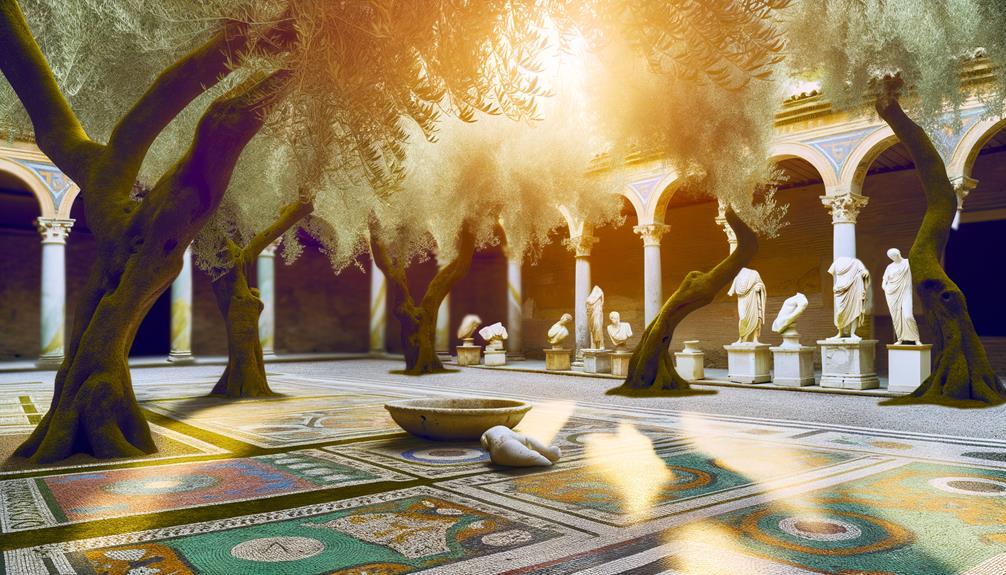Julian Name Meaning and Origin
The name Julian traces its origins to the Latin 'Julianus,' derived from 'Julius,' indicating a connection to ancient Roman heritage. Historically, it has been borne by notable figures such as Julian the Apostate and mystic Julian of Norwich, embodying leadership, intellectualism, and spirituality.
Culturally, variations like 'Julien' in French and 'Giuliano' in Italian highlight its widespread appeal. The name has fluctuated in popularity, reflecting societal shifts, yet remains a symbol of timeless elegance.
Modern associations with public figures maintain its contemporary relevance and cultural resonance, allowing deeper exploration into its enduring significance.

Key Takeaways
- Julian originates from the Latin 'Julianus,' meaning 'of Julius.'
- The name reflects connections to ancient Roman heritage and civilization.
- It has cultural variations like 'Julien' in French and 'Giuliano' in Italian.
- Historically significant, associated with saints, scholars, and emperors.
- The name maintains modern-day appeal due to its timeless elegance and multicultural resonance.
Latin Roots of Julian
The name Julian originates from the Latin name 'Julianus,' which itself is derived from 'Julius,' signifying a profound connection to ancient Roman heritage and nomenclature. This etymological lineage underscores a rich historical and cultural tapestry, reflecting the influence of Roman civilization on contemporary naming conventions.
The suffix '-an' in 'Julianus' often indicated a belonging or relation, indicating 'Julianus' means 'of Julius.' The name Julius itself is believed to be rooted in the Greek 'Ioulos,' meaning 'downy-bearded' or 'youthful,' aligning with the valorization of youth in Roman society. Consequently, Julian encompasses attributes associated with youthfulness, nobility, and classical antiquity, making it a name that bears both historical depth and enduring appeal.
Historical Significance
Julian has held significant historical prominence, being borne by numerous saints, scholars, and emperors throughout the centuries. Among the most notable figures is Julian the Apostate, a Roman Emperor known for his efforts to restore paganism in the Roman Empire during the 4th century. His reign is often scrutinized for its religious and philosophical impact.
Additionally, Saint Julian of Antioch, a revered Christian martyr, further cements the name's religious significance. Scholars like Julian of Norwich, an influential Christian mystic, contributed considerably to medieval theological thought. These individuals underscore the name's enduring legacy, highlighting its association with leadership, intellectualism, and spiritual devotion.
The historical impact of the name Julian is hence multi-faceted and deeply rooted in various domains of human achievement.
Cultural Variations
Examining cultural variations of the name Julian necessitates an analysis of its regional adaptations and historical usage trends. Different cultures have modified the name to fit linguistic norms, resulting in diverse forms such as 'Julien' in French and 'Giuliano' in Italian.
Additionally, historical records reveal fluctuations in the name's popularity across various periods and geographies, underscoring its dynamic cultural resonance.
Regional Name Variations
Across various cultures, the name Julian exhibits distinct regional variations that reflect unique linguistic and historical influences. In Spanish-speaking countries, the name transforms into 'Julián,' incorporating an accent to maintain proper pronunciation.
In Italy, it is adapted to 'Giuliano,' showcasing the Italian tendency to modify consonant sounds and syllable structures. Another notable variation is found in Eastern Europe, where 'Julian' is rendered as 'Yulian' or 'Iulian,' influenced by Slavic linguistic patterns.
These variations highlight:
- Linguistic adaptations: Names morph to fit phonetic and grammatical norms.
- Cultural heritage: Variations often retain historical and cultural significance.
- Pronunciation: Adjustments ensure names are easily pronounced within local linguistic frameworks.
Such regional adaptations illustrate the dynamic nature of names across different cultures.
Historical Usage Trends
Tracing the historical usage trends of the name Julian reveals significant cultural variations that have evolved over centuries. From ancient Rome, where Julian was derived from Julius, to contemporary times, the name has experienced diverse adaptations across different cultures. In medieval Europe, it resonated strongly within Christian contexts due to St. Julian the Hospitaller. Moving into the Renaissance, the name saw a revival among intellectuals and nobility.
| Period | Cultural Context |
|---|---|
| Ancient Rome | Derived from Julius |
| Medieval Europe | St. Julian the Hospitaller |
| Renaissance | Revival among intellectuals |
Today, Julian enjoys popularity in multilingual societies, maintaining its classical charm while adapting to modern sensibilities. The name's enduring appeal is a reflection of its rich cultural and historical tapestry.
Notable Figures Named Julian
Among the notable figures named Julian, the emperor Julian the Apostate stands out as a significant historical figure due to his attempts to restore paganism in the Roman Empire. His reign marked a pivotal moment in the conflict between paganism and Christianity.
Another influential Julian is Julian of Norwich, a medieval mystic whose theological writings, particularly 'Revelations of Divine Love,' are foundational in Christian spirituality.
In contemporary times, Julian Assange, the founder of WikiLeaks, has made a substantial impact on journalism and global politics.
These individuals underscore the name's association with:
- Historical and religious significance
- Intellectual and theological contributions
- Modern political and informational influence
Their varied legacies reflect the diverse domains in which bearers of the name Julian have excelled.
Popularity Over Time
The popularity of the name Julian has experienced notable fluctuations over the centuries, influenced by cultural, religious, and socio-political factors. In ancient Rome, the name was prevalent, particularly among the Julian gens, a prominent family, which included figures such as Julius Caesar.
During the Middle Ages, the name saw a decline, partially due to the fall of the Roman Empire and changing naming conventions influenced by Christianity. The Renaissance revived interest in classical names, leading to a resurgence in Julian's usage.
The 20th and 21st centuries have witnessed varying trends in its popularity, often reflecting broader societal shifts and the influence of notable individuals. Overall, Julian's enduring appeal is a reflection of its historical and cultural significance.
Modern-Day Appeal
Julian's modern-day appeal can be attributed to its timeless elegance, multicultural resonance, and the influence of contemporary public figures who bear the name. This name's enduring charm is evident in its consistent popularity across diverse cultures and linguistic groups. Julian seamlessly integrates into various societies, reflecting both historical significance and modern sophistication.
Key factors enhancing its appeal include:
- Timeless Elegance: Julian maintains a classic and refined aura that transcends generational trends.
- Multicultural Resonance: The name's adaptability across different languages and cultures enhances its global appeal.
- Influence of Public Figures: Prominent individuals named Julian in various fields, such as Julian Assange and Julianne Moore, contribute to its contemporary relevance.
Thus, Julian embodies a blend of tradition and modernity.
Conclusion
The name Julian, rooted in Latin origins, has demonstrated significant historical and cultural resonance across various epochs and societies. Its adaptability is evidenced by its diverse cultural interpretations and sustained popularity over time.
For instance, Julian the Apostate, a Roman Emperor, exemplifies the name's historical significance and enduring legacy. Such examples underscore the name's enduring appeal and versatility, making it a timeless choice in contemporary contexts.
The name Julian continues to be a relevant and influential identifier.






